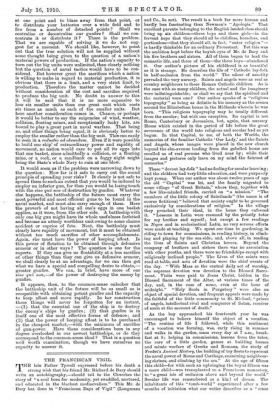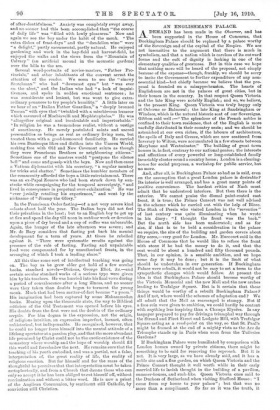THE FRANCISCAN VIGIL.
THE late Father Tyrrell expressed before his death a strong wish that his friend Mr. Richard de Bary should write an autobiography,—should tell to the Churches the story of "a soul born for modernity, yet swaddled, nurtured, and educated in the blackest mediaevalism." This Mr. de Bary has done in "Franciscan Days of Vigil" (Longmans and Co., 5s. net). The result is a book far more human and hardly less fascinating than Newman's " Apologia." That excellent parents belonging to the English landed class should bring up six children—three boys and three girls—in the fervent hope that they should all be childless, homeless, and portionless—that they should all, in fact, "enter religion "- is hardly thinkable for an ordinary Protestant. Yet this was the ambition kept before the boyish eyes of Mr. de Bary and his five brothers and sisters. All of them began to lead the monastic life, and three of them—the three boys—abandoned it. Our author's picture of his childhood is as beautiful as it is strange. He describes the life of "Catholic lay-folk in half-seclusion from the world." The odour of sanctity pervaded the very nursery. Saints and angels were as real as country neighbours to these Roman Catholic children. As is the case with so many children, the actual and the imaginary were indistinguishable; or shall we say that the spiritual and the material were one ? Our author speaks of a "religious topography " as being as definite in his memory as the scenes around the Elizabethan house in the Midlands wherein he was born. " This religious topography may be totally different from the secular; but with one exception. Its capital is not Rome, Canterbury or Jerusalem, but, again, that nursery Home which existed in the period of life before the great severance of the world into religions and secular had as yet begun. In that Capital, to me, of both the Worlds, the memories of the familiar Catholic Our Lady,' and the Saints and Angels, whose images were placed in the new church beyond the elm-avenue leading from the gabelled house are recalled as of real persons who lived near by ; while their images and pictures only leave on my mind the faintest of memories."
These " devout Iay-folk " had no feeling for secular learning ; and the children had very little education, and were purpo rely kept young. When our author was about twelve years of age the old " Capital " was let, and the family migrated to some village "of Great Britain," where they, together with a few like-minded friends, carried on " a mission." " The members of the little colony of Saintlands " (the name is of course fictitious) " believed that society ought to be governed exclusively by considerations of religion." In the village they preached their ideal, in the home they enforced it. "Lessons in Latin were resumed by the priestly tutor for my brother and myself ; but except a few readings in Nepos and in ecclesiastical Latin, no very serious efforts were made at teaching. We spent our time in gardening, in riding to town for commissions, in reading history, in climb- ing and playing by the sea-side ; and, above all, in reading the lives of Saints and Christian heroes. Beyond the company of brothers and sisters there was no association with other youths, and there were no friendships except with religiously inclined people." The Lives of the saints were read at table, and acts of devotion were the chief events of the day. " With Mass as the central daily act of worship, the supreme devotion was devotion to the Blessed Sacra- ment. Visits were paid to Jesus Christ, hidden in the Blessed Sacrament of the Altar, at various times of the day, and, in the case of some, even at the hour of midnight." "Holy Souls in Purgatory" were also an object of special devotion, and frequent appeals were made by the faithful of the little community to St. Michael, "prince of angels, intellectual rival and conqueror of Satan, receiver of souls at the moment of death."
As the boy approached his fourteenth year he was encouraged to believe himself the object of a vocation. " The routine of life I followed, while this sentiment of a vocation was forming, was, early rising in summer and walks in the garden, mass every day at 7 a.m., break- fast at 8; helping in commissions, lessons from the tutor, the care of a little garden, games at building houses and mimic warfare of Greeks and Romans, the study of Fredet's Ancient History, the building of toy fleets to represent the naval power of Rome and Carthage, examining neighbour- ing shrines, and climbing by the sea." At the age of fifteen this child—for with such an upbringing the boy at fifteen was a mere child—was transplanted to a Franciscan monastery, to "a great isle of seclusion above and beyond the world." Secular life was remembered as a kinl of dream. The inhabitants of this " tomb-world " experienced after a few months of initiation what our writer describes as a " sense
of after-deathfulness." Anxiety was completely swept away, and no sooner had this been accomplished than "the course of daily life " was " filled with lowly pleasures." Now and again we see the boy under the habit of the monk. " The extra dishes of feast-days " and the " dandelion wine " were " a delight," partly sacramental, partly natural. He enjoyed gardening and work in the hay-field and harvest-field, he enjoyed the walks and the views from the " Mountain of Calvary" (an artificial mound in the monastic gardens) over the hills to the sea.
Several word-portraits of novice-masters, "Father Pro- vincials," and other inhabitants of the convent arrest the attention of the reader. We seem to see the " sinewy Scotcluna,n" who had " downcast eyes" but " was ever on the alert," and the Italian who had "a look of inquisi- tiveness, and spoke in sudden emotional sentences ; he was considerate and lenient, but was wont to give extra- ordinary penances to try people's humility." A little later on we hear of an "Italian Father Guardian," a "deeply bronzed Tuscan" with epee that " twinkled with a mischievous humour which savoured of Machiavelli and Mephistopheles." He was "altogether original and incalculable and imperturbable." "In religion he was a tremendous realist, without a vestige of sanctimony. He merely postulated saints and sacred personalities as beings as real as ordinary living men, but treated them with a good-humoured familiarity. He carried his own Dantesque likes and dislikes into the Unseen World, making free with Old and New Covenant saints as though they were Franciscan Brothers or neighbouring citizens." Sometimes one of the masters would "postpone the silence bell" and come and gossip with the boys. Now and then came a Vatican diplomatist with his secretary, " a regular monkey for tricks and chatter." Sometimes the humbler members of the community afforded the boys a little entertainment. There was an ex-Papal Zouave who had been struck down by sun- stroke while campaigning for the temporal sovereignty, " and lived in consequence in perpetual over-exhilaration." He was "ever javially retailing his experiences," and went by the nickname of " Jimmy the Glory."
In the Franciscan Order fasting—of a not very severe kind —lasts about half the year. The Italian boys did not feel their privations in the least; but to an English boy to get up at five and spend the day till noon in outdoor work or devotion upon a piece of dry bread and a cup of coffee was unbearable. Again, the hunger of the late afternoon was severe ; and Mr. de Bary considers that fasting put back his mental development for a term of years. At times he rebelled against it. " There were systematic revolts against the pressure of the rule of fasting. Fasting and unpalatable food were compensated for by unauthorised feasts, in the arranging of which I took a leading share."
All this time some sort of intellectual teaching was going on. The boy as he grew older got hold of a few secular books, standard novels—Dickens, George Eliot, &c.—and certain secular standard works of a serious type were given him by his teachers. He was hurried into his final vows during a period of convalescence after a long illness, and no sooner were they taken than doubts began to torment the young monk. Much that bad been matter-of-fact became "a poem." His imagination bad been captured by some Mohammedan books. Musing upon the theocratic state, the way to Biblical criticism of the Old Testament was opened before his eyes. His doubts from the first were not the doubts of the ordinary sceptic. For him dogma is the expression, not the origin, of religions intuition, an expression imperfect, inexact, often unhistorical, but indispensable. He recognised, however, that he could no longer force himself into the mental attitude of a lifelong spectator at a passion play, and that the more abundant life promised by Christ could not be the exotic existence of the monastery where worship and the hope of worship should fill this world and foreshadow the next. He remains sure that the teaching of his youth embodied, and was a partial, not a false, interpretation of, the great reality of life, the reality of religious emotion. But for himself and for the mass of the thoughtful be perceives that that interpretation must be taken metaphorically, and from a Church that damns those who can only so accept it he has been obliged to cut himself off, without recrimination and without a bitter word. He is now a priest of the Anglican Communion, by sentiment still Catholic, by conviction still Christian.







































 Previous page
Previous page